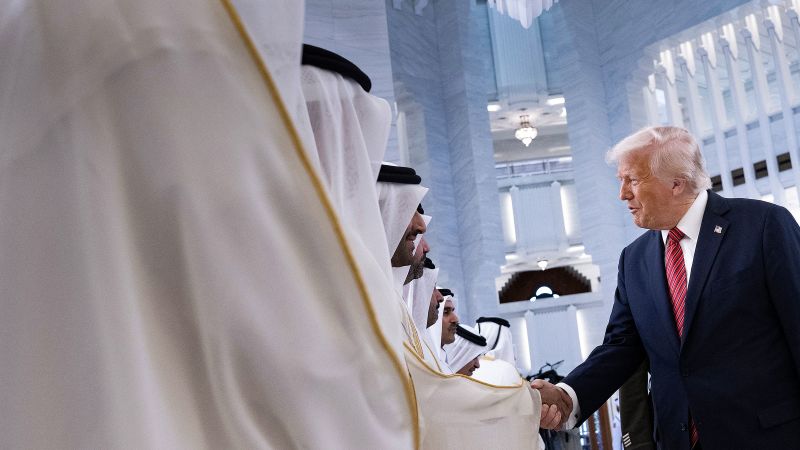In a striking departure from the isolationist tone of his previous administration, President Donald Trump’s recent overseas trip has reframed the narrative surrounding his foreign policy approach. Known for his “America First” mentality during his first term, Trump’s latest jaunt—taking him through pivotal Middle Eastern nations such as Saudi Arabia, Qatar, and the United Arab Emirates—reflects a notable shift. This journey is emerging as a pivotal moment in establishing a potentially globalist stance, though it remains contingent on circumstances that align with his interests.
During his four-day excursion, Trump has made headlines with significant policy shifts, such as lifting sanctions on Syria. This move allows him to become the first sitting U.S. president to hold talks with a Syrian leader in a quarter of a century—an act that may unsettle conservative allies who fervently supported his “Make America Great Again” (MAGA) platform. His discussions with interim President Ahmed al-Sharaa, conducted privately, may prove pivotal in characterizing the transformational nature of Trump’s trip and his evolving foreign policy.
The implications of Trump’s travels are amplified by his assertions of having played a crucial role in alleviating tensions in India and Pakistan. He also speculated about the potential escalation of Iran’s nuclear negotiations, framing them as a possible descent into violence should the Iranian government fail to engage positively with the U.S. Meanwhile, he suggested the necessity of personal involvement in peace talks with Russian President Vladimir Putin, whilst advocating for the establishment of a “freedom zone” in Gaza, where conflict has recently intensified.
As Trump reiterated to soldiers stationed at Al Udeid Air Base, “My priority is to end conflicts, not to start them,” yet he emphasized that he wouldn’t shy away from assertively protecting the interests of the United States and its allies. This balancing act highlights a nuanced evolution in his approach to foreign policy, suggesting an increased willingness to engage with global issues rather than merely withdrawing from them.
Trump’s actions during this trip underscore his deviation from previous positions, including a bygone travel ban targeting several Muslim-majority nations. In a notable yet contradictory gesture, he visited the Sheikh Zayed Grand Mosque in Abu Dhabi. He further embraced Qatar’s emir—an ally previously criticized for terrorism links. Trump appears to be cultivating a more extended diplomatic outreach than envisioned by his base, as Republican leaders hesitant to critique him have opted instead to highlight this seemingly reconciliatory approach, reflecting an interesting alignment between some conservative perspectives and Trump’s evolving policy positions.
Even voices from the opposition have lauded aspects of Trump’s Middle Eastern diplomacy, with House Intelligence Committee ranking member Jim Himes expressing approval of the discussions with Syrian leadership and Trump’s overall handling of this trip. Himes reconciled his apprehensions regarding Iran and other regional conflicts, suggesting by week’s end that Trump had fared well in his diplomatic engagements.
Throughout the journey, Trump presented himself both as a dealmaker and a peacemaker, ever operating within a transactional framework. However, many of his high-reaching aspirations appear to run afoul of geopolitical realities. In Doha, he proposed transforming Gaza into a “freedom zone,” an ambition complicated by ongoing hostilities and the dire humanitarian situation exacerbated by recent Israeli airstrikes.
While Trump is adamant about preventing Iran from obtaining nuclear capabilities, his statements drew ire from Iranian officials, who accused him of naivety for believing that pressure would yield favorable results. On various occasions, he attempted to initiate dialogue between Russia and Ukraine, hinting at personal involvement as a necessary catalyst for peace.
Amidst these engagements, Trump’s rhetoric lacked a traditional emphasis on human rights, a matter often prioritized by his predecessors in the region. This omission was evident as he developed a rapport with controversial leaders like Saudi Crown Prince Mohammed bin Salman (commonly referred to as MBS), whose legacy is shadowed by alleged human rights abuses.
Traveling with an entourage of flattery—from Arabian horses to Tesla Cybertrucks—Trump’s relationship with key figures in these nations signals a willingness to expand connections that bolster his agenda. The agreements signed during his visit touched on defense and energy, elevating the global stature of leaders like MBS while raising ethical inquiries back home regarding potential conflicts of interest.
This unprecedented outreach and intimacy with international leaders showcase Trump’s belief that effective diplomacy is rooted in personal charisma and direct engagement, a stark contrast to the more restrained approaches of his predecessors. As the narrative surrounding these diplomatic maneuvers develops, the impact of Trump’s approaches on international relations remains to be fully realized, signaling a potentially transformative chapter in U.S. foreign policy.



